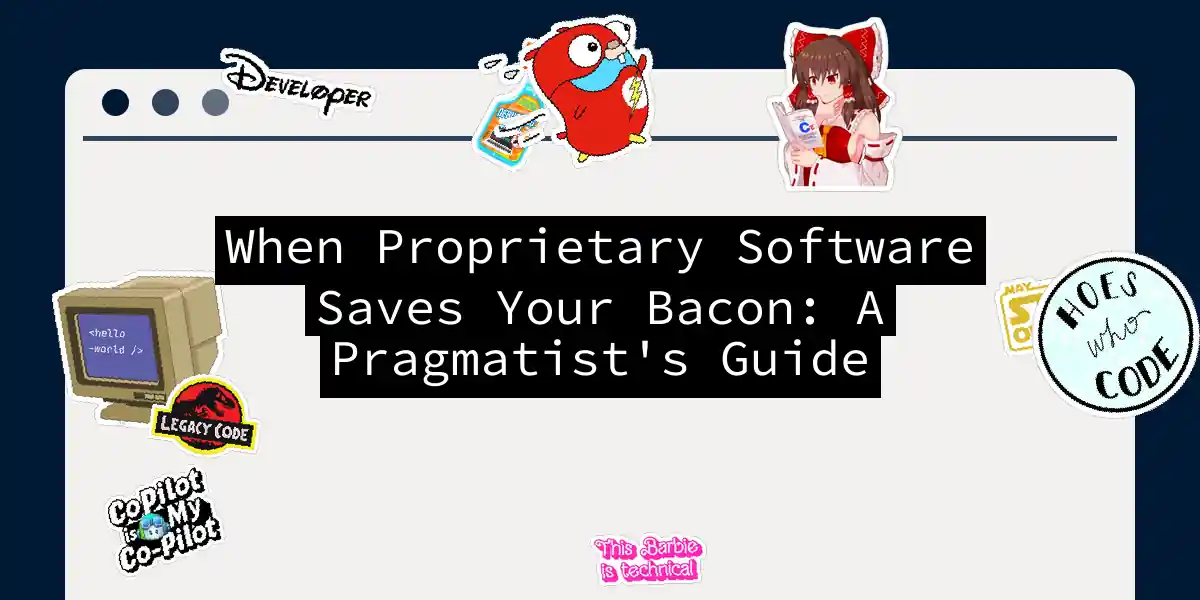Picture this: You’re building a rocket-powered skateboard for cats (don’t ask). You’ve got 48 hours till demo day. Do you A) Grab an open-source framework and hope the community answers your 3AM Stack Overflow post, or B) Use a proprietary SDK that comes with 24/7 support and a “I-break-you-call” guarantee? If you chose B, congratulations - you’ve just avoided becoming another “my startup died” Twitter thread.
The Toolbox Principle: Why Proprietary Has Its Place
Every developer loves open-source tools - they’re like LEGO blocks for adults. But sometimes you need more than bricks. You need the entire pre-fab Batcave with Alfred included. Let’s dissect three scenarios where proprietary solutions outshine their open-source cousins:
1. When Time ≠ Money (Because Time > Money)
The Startup Speedrun Scenario
# Open-source setup
git clone everything-under-the-sun
pip install dependency-hell
systemctl start pray-to-the-dev-gods.service
# Proprietary alternative
curl -X POST https://api.proprietarymagic.com/setup \
-H "Authorization: Bearer your-credit-card" \
-d '{"wings": 3, "flames": "blue"}'
The proprietary solution above isn’t just shorter - it’s predictable. As notes, proprietary systems often come with turnkey implementations that let you focus on business logic rather than configuration archaeology.
2. The Compliance Jungle Gym
When building medical devices (or even just handling EU user data), you don’t want to explain to regulators that your audit trail depends on a volunteer-maintained logging library from Npm-stan. Proprietary solutions like Azure HIPAA Compliant Databases come with pre-baked certifications that would make a GDPR officer shed tears of joy . Step-by-Step: Migrating to Compliant Storage
- Export existing data:
pg_dump -Fc my_db > db.dump
- Create secure storage instance:
az storage account create --name purrfectdocs \
--resource-group CatSkateboards \
--sku Standard_GRS \
--encryption-services blob
- Import with encryption:
blob_client.upload_blob(db.dump, overwrite=True)
3. When You Need Someone to Yell At
Open-source’s greatest strength (community support) can become its greatest weakness when:
- Your production database is on fire
- It’s 2AM
- The last commit to the project’s GitHub was in 2017 Proprietary vendors like IBM Cloud provide SLAs that essentially say “Our problem until it’s fixed” . As one CTO famously put it: “I don’t want hugs from the community when servers are down - I want results.”
The Dark Art of Total Cost Calculations
Let’s crunch numbers using everyone’s favorite metric: Pizza Equivalency
| Cost Factor | Open Source | Proprietary |
|---|---|---|
| Setup Time | 3 developer weeks 🍕🍕🍕 | 1 developer day 🍕 |
| Ongoing Maintenance | 0.5 FTE 🍕🍕/month | Included in fee |
| Compliance Certs | 2 legal pizzas 🍕🍕 | Pre-baked 🍕 |
| Stress-Induced Snacks | Infinite 🍕 | Moderate 🍕 |
As suggests, the “free” in open source often translates to “expensive” when you factor in hidden costs. Proprietary solutions turn variable costs into predictable line items - crucial for boardroom discussions where “But the community…” gets you laughed out faster than a jQuery fan at WASM conference.
When to Go Proprietary: The Cheat Sheet
- You’re building parachutes, not pet projects (Mission-critical systems)
- Your team’s expertise < problem complexity
- Regulators are breathing down your neck
- You need features yesterday (API-first proprietary services)
- Your CEO sleeps with the server room key (Security requirements)
The Support Throwdown: A Real-World Example
When our cat skateboard’s AI nose-dive detector failed spectacularly (turns out cats like free-falling), here’s how support played out: Open-source attempt:
# community_forum.py
post_question("Urgent! Cats flying everywhere!")
while not response_received():
brew_more_coffee()
check_github_issues()
# 48 hours later...
print("Maybe try rebooting the universe?")
**Proprietary solution:**
dial("1-800-PROPRIETARY")
read_error_code()
receive_patch_within(30, "minutes")
deploy()
cats_safely_skating()
The Bottom Line: It’s About Tradeoffs
Proprietary software isn’t “selling out” - it’s strategic resource allocation. Like choosing between building a microscope or using one, sometimes paying for the readymade tool lets you focus on actual science. As emphasize, the decision hinges on your team’s capacity for undifferentiated heavy lifting. Now if you’ll excuse me, I have to go troubleshoot an open-source coffee maker that’s decided to brew only decaf. Wish me luck - or better yet, wish me a vendor support contract.
